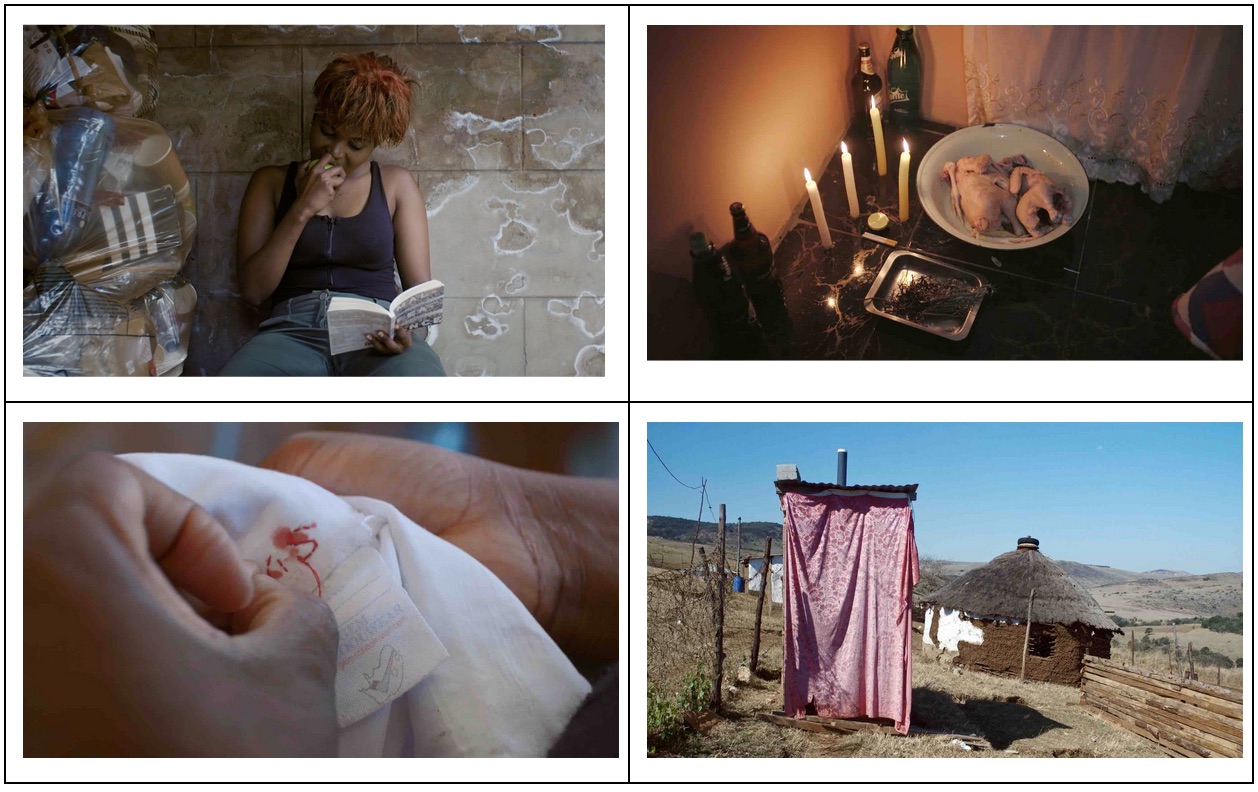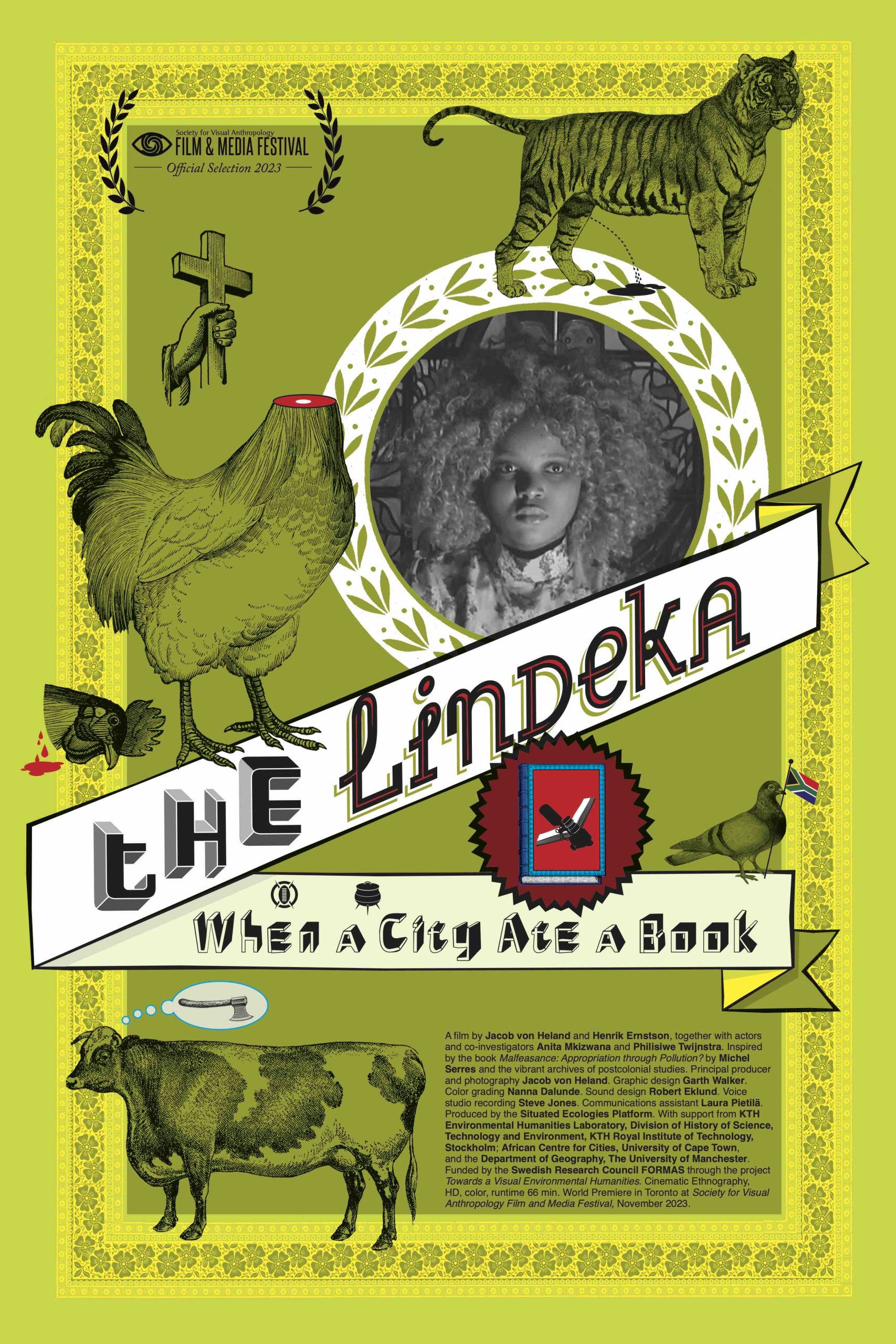The Lindeka: When a City Ate a Book
The Lindeka: When a City Ate a Book (64 min, SVA Toronto, 2023), a cinematic ethnography and essay film created by Jacob von Heland and Henrik Ernstson in collaboration with Anita Mkizwana and Philisiwe Twijnstra, World Premiere at Society for Visual Anthropology, American Association of Anthropology, Toronto, 17 November 2023. Will be released Open Access in 2025.
Short synopsis
Decades after liberation in eThekwini-Durban, South Africa, the young woman Lindeka reads the book Malfeasance. In this essay, philosopher Michel Serres fleshes out the advent of the Anthropocene in his unique “French” manner. Serres does not trace the modern planetary present to the advent of agriculture, the industrial revolution, or even the postwar “great acceleration.” Rather, his narrative of the climate crisis starts with spitting in the soup—with tracing how humans of everyday and age used practices of pollution to own and create property, with industrial society following suit to appropriate land, rivers, and the skies through pollution. Lindeka is fascinated, but finds Serres’ narrative increasingly disturbing for what it omits: Where is eThekwini-Durban, or even Africa in this universalising history of our planet? Striking up a conversation with Michel, Lindeka decides to make her own study of historical difference and global connection. Using the camera and mobilising her city, Lindeka interviews people about ancestors, participates in rituals, walks the streets, and travels to mosques, temples, graveyards, sugarcane fields, and a slaughterhouse. Through this method of enrollment, and becoming enrolled, she reads the French philosopher against the grain of her body, her relations, and her location in the world.
Long synopsis
Decades after liberation in the city of eThekwini-Durban, South Africa, the young woman Lindeka, a cine-fictitious character played by Anita Mkizwana, starts reading the book “Malfeasance.”
In this essay from 2011, the French philosopher Michel Serres fleshes out an original take of the modern planetary present, not as something that came about with the advent of agriculture, the industrial revolution, or even the postwar “great acceleration.” To Serres this is a story about how humans of every day and age have used tactics and practices of pollution and violence to own and create property for themselves. This is a far cry from conventional justifications of property that can be found in economic theory and the social contracts of Locke and Rousseau. Here the narrative of the climate crisis starts with spitting in the soup to make it yours, contemplating how the human body has ways of leaving its mark—how society (and industrial society in particular) has appropriated land, rivers, and the skies through pollution. Lindeka is fascinated by the reading, but she also finds Serres’ linear narrative increasingly disturbing for what it omits: Where is eThekwini-Durban, or even Africa in this universalising history of our planet?
Striking up a conversation with Michel Serres, Lindeka decides to make her own study of historical difference and global connection. But not through writing, but through what Stanley Cavell (2005) would have called “philosophising through film”; how film as a medium, a shared practice and an aesthetic, contributes to thinking through fundamental aspects of being in the world and taking part in public life and politics.
Using the camera and mobilising her city, Lindeka goes about her work with her friend Vinola played by Philisiwe Twijnstra. Lindeka interviews people about ancestors. Participates in customs and rituals. Walks the streets and travels to mosques, temples, graveyards, university campuses, sugarcane fields, and a slaughterhouse. Through this method of enrollment, and becoming enrolled, she is reading the French philosopher’s statements against the grain of her own body, her relations, and her location in the world. The film itself becomes a “third space,” a proper locus from where the European text of Serres can be provincialized, de-centred as it were, to form a new location from where the world can be thought and understood.
Directors’ comment
This is the second film in our trilogy of ciné-ethnographies (Rouch 2003) from South African cities. Our first film “One Table Two Elephants” (84 min, Color, CPH:DOX, 2019), explored ways of knowing urban nature in the postcolonial city of Cape Town. With this film—“The Lindeka”—we explore the methodology of “provincializing” or de-centering European thought as developed by Dipesh Chakrabarty (2000). What does it mean to use filmmaking, the screen and its registers, to de-centre or provincialize the authority of a European text? Can we achieve it by intentionally reading the essay from the locus of eThekwini-Durban, thereby allowing Lindeka the reader and her postcolonial port city to kick-back and speak their mind to Serres on ownership and environmental concerns? These were the questions that the four of us who collaborated in making this film have tried to answer: Anita, a psychologist based in Durban; Philisiwe a stage writer and performer; and Henrik and Jacob, two researchers and filmmakers based in Cape Town, Dar el Salaam, and Stockholm. The joint result is “The Lindeka,” a film set in a decolonising moment in South Africa where the audiovisual registers of film play along with, but also trouble the text, the spoken word as the active remains of Eurocentric thought in regards to how we tell stories about our planet and its environments.
Inspired by Jean Rouch, we use montage and screenings in our cinematic-centred research practice, not only in a spirit of thinking through film, but specifically to devise a process of translation by which theoretical and text-based concepts that have guided us become transformed into a collaborative, place-based, and cinematic performative practice that contributes to the academic fields of Southern Urbanism, Political Ecology, and the Environmental Humanities
References
- “Ciné-Ethnography” by J. Rouch in S. Feld (ed.) University of Minnesota Press, 2003;
- “Cavell on Film” by S. Cavell in W. Rothman (ed.) SUNY Press 2005;
- “Malfeasance: Appropriation through Pollution?” by M. Serres, Stanford University Press, 2011;
- “Provincializing Europe: Postcolonial Thought and Historical Difference.” by D. Chakrabarty, University of Chicago Press, 2000.
Credits
- Created by Jacob von Heland and Henrik Ernstson (idea, research, production, direction)
- Anita Mkizwani, Key Cast,”Lindeka”, research collaborator
- Philisiwe Twijnstra, Key Cast,”Camera Eye,” research collaborator
- Jacob Von Heland, Principal photographer
- Robert Eklund, Sound design
- Nanna Dalunde, Coloration
- Steve Jones, Voice recordings
- Garth Walker, Graphic design
- Laura Pietilä, Production assistant




